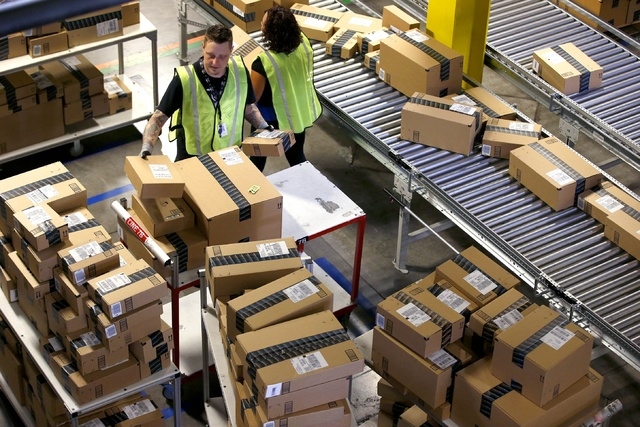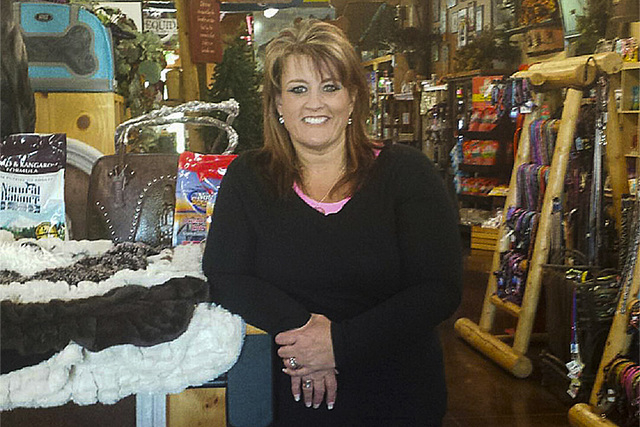Push to tax online sales heats up
Kim Hunter, the owner of “Bag of Bones,” a holistic pet food and pet toy shop in Sparks, has been in business for 10 years, but it’s become harder and harder to make a profit since the explosion of competing sales over the Internet.
That’s because online retailers aren’t required to collect state sales taxes if they don’t have a physical presence in a state, giving Internet sellers an edge over storefront businesses such as Hunter’s. In Nevada, the state sales tax is 6.85 percent. Taxpayers are supposed to pay it every year, but few do unless state auditors come calling.
“It becomes a much better deal online,” Hunter said of the sale of pet food and goods, from dog leashes to jingly cat toys. “And there’s no overhead like a storefront. They make it unfair for my business to compete.”
The same bag of dog food, for example, sells for several dollars less online.
States also are losing sales tax revenue, from $200 million to $680 million per year in Nevada, according to 2012 estimates.
But that may soon change.
Lawmakers in Washington and in Carson City are pushing this year for passage of the federal Marketplace Fairness Act, which would require online sellers to collect state sales taxes. The proposed legislation will be considered during the lame-duck session of Congress following the Nov. 4 election, U.S. Senate Majority Leader Harry Reid, D-Nev., said Thursday.
“We have to do something about marketplace fairness,” Reid told reporters as he listed his top lame-duck priorities. “That is long, long overdue. And we’re going to have to have whatever it takes to get that done.”
Republican state Senate Minority Leader Michael Roberson, R-Las Vegas, on Thursday told the Review-Journal editorial board that the Marketplace Fairness Act has bipartisan support in the Nevada Legislature, partly because it would level the playing field for storefronts and because the state needs all the sales tax revenue it can get.
GOP Gov. Brian Sandoval has been pressing the issue for the past couple of years, too. In 2012, he announced an agreement with Internet giant Amazon.com to let the state start collecting sales taxes on the company’s sales to Nevada customers beginning this year. Amazon also supports the federal legislation.
“The only way to completely resolve this issue is for Congress to enact legislation that, within a simplified nationwide framework, grants states the right to require collection by all sellers,” Sandoval said at the time. “We thank Amazon for creating jobs and investment in Nevada and are very grateful the company is working with us on a federal solution.”
Amazon has a distribution center in Fernley in Northern Nevada. It also owns Zappos, the Las Vegas-based online shoe and clothing retailer.
A majority of Nevadans support the idea of paying sales taxes when they buy goods online, according to a new poll commissioned by the International Council of Shopping Centers.
Asked their views on having “online-only vendors collect sales tax at the time of sale,” 64 percent said they supported it, 26 percent did not support it, and 10 percent said they didn’t know, according to the survey. Some 75 percent of Nevadans agreed it would be easier to collect sales taxes that way.
The poll also showed that 53 percent of Nevadans were unaware they’re supposed to pay state sales taxes on online purchases.
The poll conducted by Opinion Research Corp. surveyed 267 adults, both registered and nonregistered Nevada voters, by land-line and cellphone Aug. 22-28. It has a margin of error of plus or minus 6.2 percentage points.
“Nevadans from all walks of life and across the political spectrum overwhelmingly agree that the long-term economic health of their communities depends on a level playing field for all businesses,” said Michael Kercheval, president and CEO of the International Council of Shopping Centers.
For Hunter, the pet store owner, she’s just looking to stay in business with online sales growing each year. Her sales once were about evenly divided between pet food and toys and accessories. But people have been buying more nonfood pet items online because, unlike the kibbles and bits, they can wait for shipping. Now, 80 percent of her sales are food.
“People still want to grab their bag and take it home,” Hunter said. “So I have to sell a lot more food.”
Contact Laura Myers at lmyers@reviewjournal.com or 702-387-2919. Find her on Twitter: @lmyerslvrj.
Kim Hunter, the owner of "Bag of Bones," a holistic pet food, toy and goods shop in Sparks, has been in business for 10 years, but it’s become harder and harder to make a profit since the explosion of competing sales over the Internet.


















